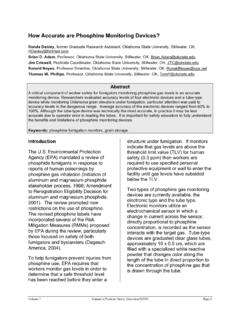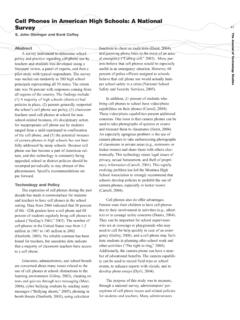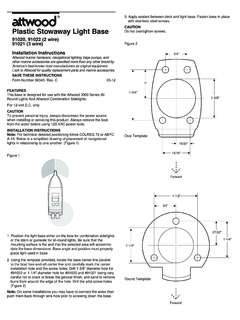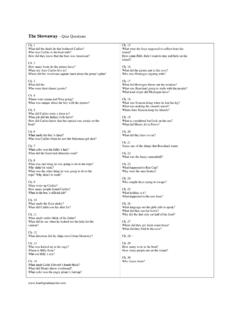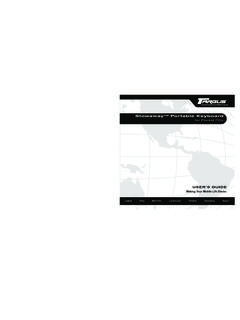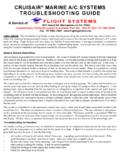Transcription of Karen Hesse's Stowaway and Witness - scholar.lib.vt.edu
1 Consider the Source: Feminism and Point of View in Karen Hesse's Stowaway and Witness Wendy J. Glenn The source through which we receive information can in fluence significantly the message ultimately acquired. In a trial setting, for example, attorneys for the prosecution and defense tweak details surrounding an event to shape jury members' perceptions of truth. The same holds true in the world of fiction; the teller shapes the tale. In several of her novels for young adults, Karen hesse , through the varied voices of her female characters, suggests a condemnation of patriarchal values. Maggie (Wish on a Unicorn), Rifka (Let ters from Rifka), Nyle (Phoe nix Rising), Hannah (A Time ofAngels), Mila (Music ofDol phins), and BillieJo (Out ofthe Dust) each struggle to survive in a male-dominated world; each character's account of life within patriarchy expresses contempt for a system that de nies individual freedom and victimizes those who refuse to comply to established stan dards.
2 His sisters, who remain nameless, are mentioned only once. We see only passing glimpses of the wives, mothers, and daughters of the natives that the crew encounters during the course of the voyage. Men rule both on land and at sea. Especially noteworthy are Nick's observations of men who hold positions of power, both on the homeland from which he fled and on the deck of the ship he hopes will carry him to safety. That which Nick chooses to reveal tells us something about his perceptions of these leaders, in particular, and pa triarchy, in general. Hesse's decision to select these details The Abusers simply reinforces her positive Nick has fled his English soil as a result of the abuse he suffers at portrayal of the atypical male and the hands of the men in his life. His further challenges an Imperialist mother has died, and he thus is raised by his father, a scholar who patriarchy under which explorers wants Nick to "overcome his soft dominated and destroyed native hearted ness" and become a man cultures.
3 Although two of Hesse's newest titles, Stowaway (2000) and Witness (2001), continue to question patriarchy, they dis tinguish themselves from other works in her body of fiction in the use of a point of view other than that of the first-person, female protagonist. In Stowaway , our narrator is instead eleven-year-old Nicholas, who flees England by boarding a ship set to sail for the South Pacific. Witness takes its form from the Spoon River Anthology of Edgar Lee Masters; eleven characters of varying ages and genders share their version of events in poetic form. In her decision to stray from her typi cal pattern, hesse continues to explore gender issues but pro vides a look at patriarchal culture from within, in one case, and from multiple points of view in the other, ultimately strengthening the feminist pulse that beats within her earlier works. Stowaway Through the Eyes of a Boy In Stowaway , we learn about the world as experienced and recorded by young Nicholas in the journal he maintains during the voyage.
4 This world is a man's world, one in which women playa negligible role. Nick's mother has died, and (22). Because Nick is not interested in learning his Latin and becoming a scholar like his brothers, he is "a disappointment" to his father (3). One Christmas, Nick de sires to leave his boarding school and spend the holiday in the comfort of his family. He runs away, and, after arriving home "tired, hungry, cold," his father says nothing, "not a single word," places him in his carriage, and drives him back to school (44-45). The father lacks compassion, embodying instead an emphasis on stoicism and "indifference," traits exemplified by the stereotypical male within the patriarchy (68). Nick's teacher, Reverend Smythe, is another powerful man; he takes "pleasure in beating others" (13). Realizing the punishment he might face should he beat one of his stu dents, he instead, as patriarch and leader of his family, "beat[s] his own children, staring at [his boarders] all the while," forc ing them to Witness his cruelty (13).
5 When Nick's father re turns him to school after his attempt to run away for the day, the Reverend strikes "his youngest daughter, Josephine, eight years old, [Nick's] age, with a particular ferocity" (45). Nick is the only Witness to the event. When Nick's father completely gives up on his son's poten tial to enter the realm of the intellectual, he apprentices him to the local butcher, telling the boy, "The Butcher'll make a man out of you" (22). Once the Butcher brings forth the Winter 2003 30 whip, forever scarring Nick's tender skin, Nick does not wait to learn what else the butcher might teach him. In his few years, Nick interacts with men whose power gives them the self-perceived right to abuse that power, to manipulate those beneath them in the patriarchal hierarchy. The Distanced Intellectual While aboard Endeavor, Nick encounters Mr. Banks, an other man who wields power. A botanist and gentleman as signed to gathering and cataloging new plant and animal life discovered on the journey, Mr.
6 Banks represents the culture of dominance in its civilized form. Mr. Banks is well-educated and has risen to the top of his field by virtue of his accumu lated knowledge and subsequent expertise (5). He is used to getting his way and demonstrates little patience when the weather refuses to cooperate or the captain refuses to allow him and his fellow scientists and artists to go ashore. He is not cruel but shows the marked self-centeredness of a man in control. Although his "dark eyes are lit with an eager curios ity," he admires nature not for what it is but for what it can offer him as a man of science (5). When, for example, the ship comes upon a waterspout the "width of a tree trunk," Mr. Banks is unimpressed. Nick notes, "I suppose he could not shoot it, nor bag it, nor stick it in a glass bottle, and felt it not much to consider" (108). Nick, in contrast, views it as "a thing of wonder" (108). In another instance, Mr. Banks is asked to part with one of the dogs that has been traveling with him; the natives consider dog a delicacy.
7 Mr. Banks parts readily with the beast, even though Nick claims it to have been loyal to and valued by the crew. He reveals, "Mr. Banks says nothing about Lord Grey's absence. Only a Gentle man could have given something so dear with such ease" (245). Mr. Banks is not unkind like the men Nick has known in his past, but he lacks the ability to empathize and consider the needs of those below him. The Gentle Leader Nick finds a model of masculinity that he can admire in the form of Captain Cook, a "clean-shaven man, strict and stern, with cold eyes," but "a good man" who repeatedly demonstrates his concern for others (2, 44). Although a re spected leader among his men, Cook does not take advantage of his position of power. He, for example, "eats no more, no less, than any man on the ship" (222). In addition, he is "determined to keep his men healthy and well fed," even to the extent that he administers "twelve lashes a piece" for turning away one's portion of beef (13). Further, after the captain is insulted by the Portuguese sailors who control the port at Rio de Janeiro, he refuses to give in to his anger, realizing his men's lives depend upon the provisions that will be stocked on this stop (36).
8 Finally, when the vast majority of his crew members die as a result of bad water collected at Batavia, the captain is obviously overcome with sadness and loss. Although he continues to perform his duties, "his heart seems broken" (259). Nick reveals, "He kept us safe and healthy for so long, and now he watches the men slipping away" (259). In addition to caring for his men, Cook is respectful in his dealings with the natives; he teaches Nick the value inherent in every Plan. When landing on King George's Land, he cautions his men to respect the natives by taking "nothing from the island without making payment, not even wood" The ALAN Review and to behave as guests in the home of a foreigner (73). Be fore landing on Otahiti, he requires the ship's surgeon to "check all the men for infectious disease" so they "might not bring European illness among the natives" (87). Finally, when King Raja of the West Indies excuses himself from a feast, thinking he is not invited due to his black skin, the captain "soon made it clear that he was welcome" (243).
9 Critic Elizabeth Bush claims this portrayal of Cook re flects Hesse's attempt to be politically correct; the description of his treatment of the natives is "inserted to soothe twenty first century sensibilities rather than reflect contemporary mores" (65). However, while hesse depended on historical documents in the creation of her text, she is creating fiction and is thus allowed to select details that best fit her percep tion of the character, even if an historically accurate por trayal does not result. Even contemporary men sometimes clash with "contemporary mores." Hesse's decision to select these details simply reinforces her positive portrayal of the atypical male and further challenges an Imperialist patriar chy under which explorers dominated and destroyed native cultures. After observing Cook in the duration of the voyage, Nick deeply admires him. He writes, "Captain is a wondrous man, I think. I did not have a very high opinion of certain men when I came aboard. Captain has taught me that a man might be stern, even harsh, and still be fair" (222).
10 He re spects the captain for his compassion and convictions, seeing in his leader the kind of man he, himself, might become. As a male, Nick is granted access into the realm of social power; that he chooses to emulate a man who behaves outside the realm of stereotypical masculinity says much about the novel's representation of what a praiseworthy man should be. Nicholas is both outsider and insider, providing a unique view of life within patriarchal culture. He is, at first, an outsider due to his age. He must learn the ways of men in order to be admitted into their ranks. Unlike the female pro tagonists we have seen in Hesse's fiction, Nick has the oppor tunity to enter the world of the insider by virtue of his gender. Indeed, over time and with hard work, he demonstrates his ability and dedication and is thus rewarded with approval on the part of his crewmates. More importantly, however, Nick chooses to forgo the invitation into the traditional patriarchal world; he knows that he is giving up power (a choice not granted to his female peers) but does so anyway.
